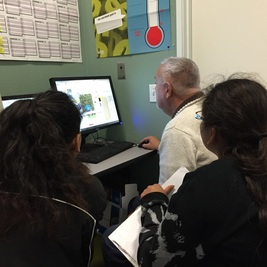 My Yearbook Students Receiving a Lesson from Our Representative My Yearbook Students Receiving a Lesson from Our Representative I would like to say that integration of technology and project based learning is helping to prepare my students to work at Google. But, in reality, my yearbook class is actually doing a better job than my English class. According to Thomas L. Freeman in “How to Get a Job at Google,” the five hiring attributes at Google are: cognitive ability, emergent leadership, humility, ownership, and expertise (2014). The students on my yearbook staff develop these skills as they work together to publish San Pasqual Academy’s yearbook. Cognitive Ability In order to create the yearbook, my students must explore and learn. Their cognitive abilities are tested throughout the design process. The class uses uses a program called StudioWorks to build our book. It is published by our supplier, Balfour, and is completely web-based. The interface is different from almost anything my students have worked with and a simple mistake of pushing a key command that works in another application may cause unsaved work to disappear. Since this program is Balfour’s product, very little just-in-time support exists. We are provided with guidebooks, a representative, and a technical support help desk phone number, but we cannot simply Google a YouTube tutorial when we are stuck. Additionally, yearbook staff is normally very small--only three to five students--and our master schedule often creates years when it is impossible to have any returning students in the class. Instead of walking them through each step of design and publishing, I push them to use their resources to figure things out, provide help when they are stuck, and encourage them to call the help desk phone number when we are all confused. As a result of these challenges, my students often spend hours teaching themselves. Emergent Leadership This spring break, my class faced an unplanned obstacle that escalated one of my students into an unofficial leadership position. My editor faced some personal challenges and had to step back from the project. To fill her place, the photo editor quickly took over. She taught herself to design pages and began delegating the photographic tasks to other students. When the editor returned, they combined skills and increased productivity. This simple challenge provided an opportunity for a student to display and practice emergent leadership skills. Humility In the revision process of creating the yearbook, I often come across a page that does not align with our design theme or contains a stylistic flaw, such as a photo of a person who appears on two consecutive pages. Situations like these create moments when honest, constructive criticism is necessary. In years past, I have had students completely shut down when I told them a page they had worked on needed to be redone or revised. However, when students are able to work through these setbacks, they are able to understand that humility is necessary to collaborate to accomplish a common goal. Ownership This year, ownership has been one of the biggest lessons my yearbook team has learned. In years past, I have swooped in and finished pages after deadlines were missed. The book was completed on time, but the students were not invested in the creation process or deeply proud of the end product. I realized that I had been taking away their ownership. This fall, I told my students that I would not finish the book for them. They did not believe me, because they know that I always swoop in and save them. Unfortunately, my girls are currently in the process of really learning the responsibility of taking ownership. We have already significantly missed our final deadline. But, I am letting them struggle. Instead of just dropping their grades and finishing it on my weekends, they are spending their weekends finishing the book. When the book is printed, it will be their book. Expertise Last year, my yearbook editor was a returning student to the class. Out of all of the students, he was our expert. However, he was not motivated to create the book and resisted teaching other students what he knew. As a result, he actually became more of a hindrance to the creation of the book--even though he knew more than anyone else! We saw that expertise is only useful when the expert is willing and able to contribute to a goal. Looking Ahead Even when I am just teaching an elective class, it is challenging for me to help my students develop the traits necessary to work somewhere like Google. I want to break things down into baby steps and micromanage their projects. I want to make sure they succeed, but I need to give them space to learn. As I look toward the upcoming school year, I want to push myself to create authentic learning experiences in my English classes. As I do so, I need to keep the following in mind:
Works Cited Friedman, T. (2014, February 22). How to Get a Job at Google. Retrieved June 21, 2015.
1 Comment
6/20/2015 04:39:15 pm
Natalie,
Reply
Leave a Reply. |
@npriesterA collection of my learning from SDSU EDL 680 Seminar in Personalized Learning Archives
August 2015
Categories |
 RSS Feed
RSS Feed